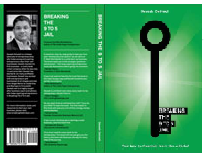Employee Turned Entrepreneur – Lorenz Lammens
Posted Under: Entrepreneurship, Our Heroes
Today under the “Our Heroes” series we interview Lorenz Lammens, a marketer who created sales proposals for multi-national corporations. After the recession hit, Lorenz and his wife volunteered their time and dedicated themselves to helping small businesses navigate thru the economic turmoil. The process they created now serves as the basis of Lorenz’s company, Online Design Bureau . Let’s talk to Lorenz and find out more…
 DD: Who are you and what kind of corporate job were you at?
DD: Who are you and what kind of corporate job were you at?
LL: After a career in animation, where I moved up from managing to managing the marketing, I decided to move to London and try to play with the big guys. There’s nothing like jumping into shark infested waters to learn how to swim.
I found a job in less than two months as a marketer for a corporation called Admedia. They were a media owner and my job was to create sales proposals that would appeal to big brands such as Unilever, P&G, Guinness, T-mobile, etc.
During my stay there, it quickly became apparent that ‘media firsts’ were all the rage. Huge budgets were spent on creating a unique advertising idea that would get a lot of attention in the press and would spread virally by word of mouth. Viral marketing is often associated with the web and that is one place where it thrives, but a viral idea doesn’t always need to start on the web. A great example is the Alien vs. Predator marketing campaign: electronic sheets were placed on the streets of London where people could vote on who they thought would win: the Alien or the Predator.
The job was fun because it required a lot of creativity and it really accelerated my learning because I was part of national campaigns conducted by FTSE 500’s. The benefit of working for a small company is that you get lots of room to experiment; bigger companies often think they already have all the answers and can keep you on a tight leash, outsourcing creative projects to creative agencies. To make a name for yourself, it is better to start out in the agency then in the FTSE 500 itself.
The lesson that I learned during this job is the power of creativity and new ideas, something that would stay with me for years to come. Innovation is the true driving engine of a company.
I climbed up the ranks, but after a few years found myself at the top of the ladder. In small companies, you quickly hit the ceiling.
DD: What made you leave the job? When did you realize that you wanted to be an entrepreneur & why?
LL: The natural solution was: go work for a FTSE 500, enter as a manager and hope to move up to become a Vice President or better.
Then I remembered that the power of being an outsider advanced my career very quickly. As an outsider, you are much more quickly regarded as an expert. No matter how good you are at your job, once in a job, you have to play by the rules and move up the ranks via the beaten path. This is especially true of big corporations.
My answer was to start a consultancy. I had to look for a job anyway, and why not create a company and look for a client instead, all the while ensuring my independence? Our first client was the Hilton Group and we worked exclusively for this corporation for a few months. In order not to put all my eggs in one basket, I sought ways to diversify and added the Hallmark Channel, JOY and the Cricket Den to my portfolio. I also worked as a consultant for my old company.
Being an outsider allowed me to keep focusing on innovation, finding new ways to engage with markets. For all of these companies, we embraced the power of the web: creating communities around brands and make people feel part of a bigger community, while finding ways to use their individual creativity to stimulate the brand through conversation. It kept brands fresh: living, breathing entities created both by a community of employees and a community of customers who could work together to create unique and personalized experiences.
DD: How did you prepare yourself for the employee to entrepreneur transition?
LL: A recession can be a beautiful thing. Recession = rebirth, in my eyes anyway.
We had to move to Dallas, TX for family reasons. The recession had come into full swing, and a lot of companies were hurting out there. Their natural roots to market were producing few clients, if any at all.
My wife and I started giving our time as volunteers to help businesses cope with the new market: one where most consumers were afraid to spend money and where the net community had to be wider and more targeted.
We worked for small businesses and it reminded me that the most powerful innovations are found in small to medium enterprises. Big corporations act to protect their market share while small companies try to change the game to find entry in the market. As a result, big corporations are conservative in trying to protect the status quo, while small companies are disruptive in trying to take on big corporations where they least expect it.
We sat down with small businesses and helped them to redefine themselves using the following process:
- What is your ideal project?
- Define the customer that would want this project.
- Can they already get this somewhere else?
- What are the needs and desires they have that no-one has fulfilled yet?
- How can we improve our offerings by including these needs and desires?
- Do current solutions in the market frustrate them in some way?
- How can we improve our offerings to take away that frustration?
- How can we clearly message that we have the solution for client needs?
- Where can we find these clients? What is their natural habitat (where do they hang out, both offline and online?)
- How can we reach them in this habitat?
- Create offline and online advertising solutions with clear calls to actions.
- Measure the success of each advertising channel, both offline and online.
- Once success data has been selected, focus on the 20% of channels that truly worked and expand these.
- Document the steps that were successful and turn them into software that can help us automate both sales and marketing tactics that work.
Once a process is established and sales are being generated, we ask the question: how could we subvert this success? How can we create new ways of doing business that could compete with a company like ours? That way, innovation is built in to the company, constantly improving offerings and finding new roots to market.
Is it hard work? Yes. Is it worth it? Absolutely.
DD: What are your Top 5 (or more) tips for employees who want to be entrepreneurs but are hung up on something?
LL: Punch above your weight. Use the method we described earlier to redefine your business, your customer base and your offerings. And once you get into a groove, keep what works but find new ways to compete. Stay nimble. Remember: the need to change should be felt before you are under pressure, because by then it is often too late and you’ll lose market share to the competitor who thought of the innovation first.
Start small, focus on what you can do better than anyone else, and grow from there. If you are a start-up, give yourself room to learn and make mistakes. They will point you in the right direction. Failure does not exist, just move from learning experience to learning experience and you will find the solutions that bring success.
DD: How are you now? Are you still in the same business, and how do you feel?
LL: The process we created during our volunteer work is now the foundation of our company. We started in November by giving away 200 free hours to a non-profit and charity and this, combined with our volunteer work, has created buzz in our local community.
Our company exited beta this month and we already have a substantial client base, despite the fact that there is still a slow market.
DD: Wow Lorenz! Thank you so much for sharing your story with me! I think it is wonderful that you and your wife have been working on this together and that the company blossomed from the volunteer work that you have been doing in your community. You are helping others with their businesses while yours begins to thrive! Great work! I wish you the best of luck with Online Design Bureau.
LL: Devesh, thanks for taking the time to hear about our company. It is very rewarding to see our efforts pay off and help others with their business and marketing, and it is a great feeling to know that this is really something that we founded ourselves. I also wish you the best of luck in the future. Take care Devesh!
DD: Lorenz Lammens everyone, corporate management marketer turned entrepreneur and founder of Online Design Bureau, a software solution that brings advanced Web 2.0 marketing techniques in the domain of SME’s, without the need of any technical knowledge. He turned his passion for helping others improve business into his own consulting company. And like he said, remember to “focus on what you can do better than anyone else”, that’s what makes you stand out from the crowd. Thanks Lorenz!
Success to all!





